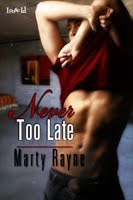Yesterday, I returned from a business trip to Moscow. It was my first time in Russia. Now, you might find this ironic, considering how many Russian characters I have created.
Then, I’m using a Russian pseudonym. It used to be that German writers chose English pennames to pass for British or American – largely because the German reading public firmly believed that “German writers can’t write entertainment”. When I began writing gay romance in English, it was clear I needed a pseudonym. German is all but unpronouncable for most English speakers. I considered going with an English-sounding name. Then I thought, “hang on, there are plenty of those”... and my heart has been beating for the Russians ever since a childhood first terrified of the nuclear holocaust, then when relief when Gorbachev made the Russians “human”. Sting’s “The Russians love their children too.” As a child of the Cold War, I was always fascinated with the side whose story we in Western Germany were never told. While America was the “cool place”, Russia – or then the Soviet Union, was the mysterious place. I was way more intrigued by the one side that I didn’t understand.
But of course, I’m not Russian, and while I have Russian friends, all I knew up to now was theoretical. Triggered by that age-old fascination, I’ve read a lot about Russian history and culture. I have shelves and shelves of books about various subjects, and I know too much to romanticise Russians...too much.
What I want to say is, three days ago, I stood on Red Square – the place of military parades and of GUM, the Russian version of Harrod’s or Saks. I’ve walked past the highly polished block of copper-coloured atrocity that is Lenin’s tomb, and photographed the crazy coloured domes of St Basil. I’ve talked to Russians (bankers and other finance people) about their country. One guy walked me back to Tverskaya street, the massive, constantly gridlocked representation boulevard which makes Oxford/Regent Street look like Legoland – it’s so big and busy it’s mind-numbing. I’ve seen nothing like it – not Unter den Linden in Berlin, and not even the Champs Elysee in Paris. Moscow is its own category.
When the guy walked me to Tverskaya, we walked past an official building, I think a Ministry of some sort. In front stood two Russian military/paramilitary types looking bland and bored and wielding big automatic weapons (machine pistols? I didn’t look that closely). The guy next to me walked a little faster, noticed my interest in the building and said “never attract their attention. They are thugs. If you look Russian, you’ll pass... if you look like something else, you’re automatically a target.”
I knew that. It’s even in “First Blood”, the book Barbara Sheridan and I wrote and which was released today by Dreamspinner. There’s a passage where one Russian calls the police corrupt and “thugs”.
I knew all that, because I’ve done my research, and spoken to Russians, but up until this man’s cautious sneer when he talked about them, it has never really sunk in. What it means to live in a society that is afraid of its police and that keeps its head down, glad they fit in, glad that they look Russian, rather than, say, Chechen or Chinese, or whatever. Despite all my research, I was ridiculously naive.
There are many things I could talk about – the violent clash of pre- and post-Soviet architecture, which is a brutality and coarseness on the mind that makes you reel. The permanent Moscow gridlock that lasts from morning until late in the night. The fact that there are never enough taxi drivers and that you can just flag down a private car, negotiate a price and destination, and get taken to your destination by a total stranger. While I was in Moscow, the “thug police” abducted a gay activist, kept him somewhere for two days, and then released him outside the city.
As the Moscow Times wrote, rather laconically, “He then went home by bus”.
If anything, I admire how the Russians are dealing with adversity. There is a fundamental irony and jadedness behind it all – like the other option would be to cry over it, but clearly, that country has cried so much it has no tears left.
So, from this, two things. One – I really, viscerally understand what I only rationally understood before. And second – I was damn glad when I saw a British policeman that I don’t have to “fit in”, that I’m living in a country where I don’t have to be afraid, where I don’t have to keep my head down.
When I told my partner this, he laughed. “Yeah, but you’re not black and poor.”
Point taken.
Subscribe to:
Post Comments (Atom)



















1 comment:
Aleksandr, that was a fascinating glimpse into your trip to Russia - literally and figuratively. And the end - your partner's comment - drove home the point. Great writing and commentary.
Post a Comment